MIC Postdocs & Research Associates
MIC Postdocs & Research Associates
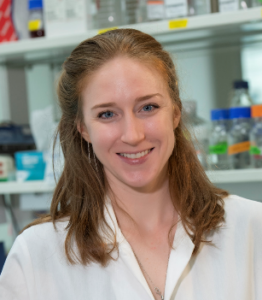 Haley E. Adcox, PhD
Haley E. Adcox, PhD
Postdoctoral Research Associate
Department of Microbiology, Immunology & Cancer (MIC)
University of Virginia
Email: dmg8ny@virginia.edu
Haley acquired her PhD at Virginia Commonwealth University under Dr. Jason Carlyon primarily investigating two different effector proteins and how they modulate the immune response for the benefit of the obligate intracellular bacterium, Orientia tsutsugamushi, the causative agent of Scrub Typhus.
Due to the lack of currently developed genetic tools for chromosomal manipulation of O. tsutsugamushi and the limited lab options for utilizing in vivo model systems, Haley decided to leave the Rickettsiales world and jump into the more competitive field of Chlamydia trachomatis. Although still a very difficult task, the Chlamydia field is on the leading edge for utilizing and developing genetic tools for obligate bacteria that have undergone reductive evolution.
In the summer of 2023, Haley joined the lab of Dr. Isabelle Derré to study C. trachomatis pathogenesis. While still maintaining an interest in host-pathogen interactions, a lot of her work now heavily focuses on the bacteria and how it regulates conversion from an infectious to a non-infectious but replicating form early in its developmental cycle.
 Dilruba Akter, Ph.D.
Dilruba Akter, Ph.D.
Postdoctoral Research Associate
Microbiology, Immunology & Cancer (MIC) Department
University of Virginia
Email: amz3jg@virginia.edu & dilruba117@gmail.com
Dilruba Akter is a postdoc in the Cliffe Laboratory at the University of Virginia, where she investigates the interplay between viral infections and neurodegenerative diseases. She earned her B.Sc. (Hons.) and M.Sc. in Microbiology from the University of Dhaka, Bangladesh, and completed her Ph.D. at SUNY Upstate Medical University, USA. Her doctoral work was focusing on how Human Cytomegalovirus (HCMV) induces heat shock factor 1 (HSF1) to promote viral replication, with potential therapeutic implications. Currently, her research centers on exploring the effects of HSV-1 infection in mice, particularly how HSV-1 synergizes with genetic risk factors (APOE mutations) to accelerate cognitive decline and CNS pathology, with a focus on Alzheimer’s-related biomarkers.

Sophia Baldysz, PhD
Postdoctoral Research Associate
Department of Microbiology, Immunology & Cancer (MIC)
University of Virginia
Email: jme7yu@virginia.edu
Sophia Baldysz is a postdoctoral researcher in the Rekosh & Hammarskjöld lab, where she serves as a bioinformatician specializing in RNA‑seq analyses. Her primary research examines alternative splicing and intron retention dynamics in cells following knockdown of splicing‑complex genes. She also contributes to projects investigating human endogenous retroviruses (HERVs) and SARS‑CoV‑2 through large‑scale genomic data analysis.
Sophia joined the Rekosh & Hammarskjöld lab in 2023 under the BioLab program. She earned her PhD at Adam Mickiewicz University in Poznań, Poland, where she devised a machine‑learning approach for identifying phage cell wall–associated lytic proteins. Today, she applies her programming expertise to design automated pipelines that streamline bioinformatics workflows.
In addition to her scientific pursuits, Sophia is a competitive professional bridge player.
 Kristina N. Delgado, Ph.D., is a biomedical scientist with expertise in immunology, molecular biology, and infectious disease research, with a focus on host–pathogen interactions and vaccine development. Her career began with service in the U.S. Navy, which strengthened her leadership and teamwork skills while inspiring her passion for biomedical research. She earned her B.S. in Biological Sciences from Georgia State University. She later gained virology experience at the USDA Foreign Animal Disease Laboratory at Plum Island, where she worked in BSL-3 facilities with Tier 1 select agents, before joining the Spirochete Research Laboratory at UConn Health.
Kristina N. Delgado, Ph.D., is a biomedical scientist with expertise in immunology, molecular biology, and infectious disease research, with a focus on host–pathogen interactions and vaccine development. Her career began with service in the U.S. Navy, which strengthened her leadership and teamwork skills while inspiring her passion for biomedical research. She earned her B.S. in Biological Sciences from Georgia State University. She later gained virology experience at the USDA Foreign Animal Disease Laboratory at Plum Island, where she worked in BSL-3 facilities with Tier 1 select agents, before joining the Spirochete Research Laboratory at UConn Health.
She went on to earn her Ph.D. in Biomedical Sciences with a concentration in Immunology from the University of Connecticut, where her research focused on identifying protective antigens in Treponema pallidum, the causative agent of syphilis. Her work culminated in the identification of several extracellular loops of Treponema pallidum outer membrane proteins as promising vaccine antigens, demonstrating their ability to elicit functional antibodies with opsonic and bactericidal activity. She further advanced the field by developing novel assays and engineering a GFP-expressing strain to study host–pathogen interactions.
In July 2025, Kristina joined the Cliffe Laboratory at the University of Virginia, returning to her passion for virology. Her current research focuses on uncovering the mechanisms underlying HSV-1 persistence and reactivation in sensory neurons, including how viral and host proteins interact to shape innate immune pathways and influence viral genome activity.
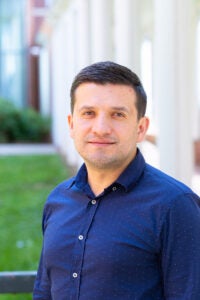 David Delgado Díaz, PhD
David Delgado Díaz, PhD
Postdoctoral Research Associate
Derré Lab https://med.virginia.edu/derre/
Microbiology, Immunology & Cancer Biology Department
University of Virginia
Email: rqz4ez@virginia.edu davidjosedelgadodiaz@gmail.com
Publications: Google Scholar
LinkedIn Profile: https://www.linkedin.com/in/daviddelgadod/
David is a microbiologist and biotechnologist with a strong interest in sexually transmitted infections (STIs), particularly those affecting underserved populations. After earning a Bachelor’s degree in Biotechnology Engineering in Peru, he moved to Australia, where he completed a Master of Biotechnology at the University of Melbourne and a PhD in Microbiology and Immunology at the Burnet Institute and Monash University. His doctoral research explored how vaginal microbiota-derived metabolites influence immune responses and epithelial barrier integrity in the female reproductive tract, and how these changes affect susceptibility to HIV, leading to three publications.
During his PhD, David was awarded the prestigious MBio Postgraduate Discovery Scholarship from Monash University, which funded his tuition and stipend throughout his studies. He also received travel grants from HIV Research for Prevention (HIVR4P) and the Burnet Institute’s Pauline Speedy Travel Award, allowing him to present at HIVR4P 2018 in Madrid, Spain, and the 2020 Australasian Virology Society (AVS) meeting in Queenstown, New Zealand.
Following his PhD, David spent four years in the biotechnology industry, where he developed innovative, multiplex point-of-care diagnostic tools for infectious diseases. This experience sharpened his skills in product development and translational research, reinforcing his ability to bridge scientific discovery with real-world application.
Currently, David is a postdoctoral researcher at the University of Virginia in the laboratory of Dr. Isabelle Derré. He is leading the development of a novel 3D biomimetic model of the human cervix to study Chlamydia trachomatis infection in a physiologically relevant context. His interdisciplinary approach integrates microbiology, cell biology, immunology, and bioengineering to recreate the complex cervical environment—including cellular components, mucus, microbiota, and sex hormones. This platform aims to uncover key microbial and host factors driving STI acquisition and progression, and to support the evaluation of new preventive and therapeutic strategies.
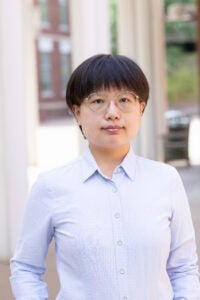 Songyu Dong, PhD (she/her)
Songyu Dong, PhD (she/her)
Postdoctoral Research Associate
Department of Microbiology, Immunology & Cancer (MIC) University of Virginia
Email: wmk3ty@virginia.edu
Publications
LinkedIn Profile
Songyu received her PhD from Ohio State University, where she studied the pathogenic mechanisms of actin-targeting bacterial ADP-ribosylating toxins. She analyzed the behavior of ADP-ribosylating toxins secreted from various pathogens, including Photorhabdus luminescens and Salmonella enterica, under more physiologically relevant conditions in the presence of multiple host regulators. Impressed by how bacterial toxins efficiently manipulate the complex actin cytoskeleton, she joined the Agaisse lab in the MIC Department in December 2024 to investigate the interactions between actin-binding proteins and virulence effectors of Shigella flexneri.
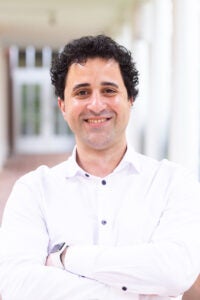 Leandro Fernández-García, PhD
Leandro Fernández-García, PhD
Postdoctoral Research Associate
Department of Microbiology, Immunology & Cancer (MIC)
University of Virginia
Email: bqd4gs@virginia.edu & leandrofg1990@gmail.com
LinkedIn Profile
Leandro is a general Microbiologist with extensive experience in Virology, which includes viral detection from clinical and environmental samples, host response to viral infection, endogenous viral elements (EVEs), and basic virology research like cell-virus interaction, virus evolution, and viral mRNA translation. He obtained the BSc in Microbiology from the University of Havana, Cuba, and PhD in Microbiology from the University of Chile, Chile. He is interested in studying viral mRNA translation initiation mechanisms and how virus infection subverts the host cell translation. Previously, he described and characterized the Internal Ribosome Entry Site (IRES) of Dengue virus (DENV) RNA as well as the role of the Polypyrimidine tract binding protein (PTB) as a DENV IRES trans-acting factor (ITAF).
At UVA in Dr. Mariano A. Garcia-Blanco’s Laboratory, he continues working on the non-canonical translation mechanism of the Flavivirus´s mRNAs, exploring the role of host RNA-binding proteins (RBP) in viral protein synthesis.
 Niti B. Jadeja, PhD
Niti B. Jadeja, PhD
Postdoctoral Research Associate
Department of Microbiology, Immunology & Cancer (MIC)
University of Virginia
Email: nitijadeja@virginia.edu
Google Scholar Profile
LinkedIn Profile
Niti has a doctorate in Biotechnology from CSIR-NEERI & RTMNU, Nagpur, India where she worked extensively with the Central and State Governments and private industries. She specializes in Molecular Biology, Metagenomics, and Systems approaches. More specifically, she is driven by the questions of novel gene functions, gene transmissions, genetic adaptations, evolution, and stress response. Her research aims at understanding the ever-evolving genetic functions in microbes and more recently in host-pathogen interaction. She was awarded a CSIR-Senior Research Fellowship (2015) and was invited by the Academy of Finland (2016) to work at Syke in Helsinki during her doctoral research. She volunteers as a mentor to students who wish to translate their scientific findings into industrial applications. Her work finds application in understanding host-pathogen interactions, immune response, drug discovery, communicable diseases, bioenergy, environmental sustainability, and OneHealth.
Currently, she applies her expertise in Molecular Biology and Bioinformatics at the Agaisse Lab in the MIC department to study the evolution and pathogenesis of Shigella species using in-vivo models, integrated ‘omics, and cell biology techniques. Her work focuses on finding biological markers and identifying immune cells enriched in host-pathogen interactions. She likes to teach and continues to mentor students at the Agaisse lab.
 Sidra is a microbiologist passionate about using bacterial systems to understand human diseases and cancer. Her doctoral research at the National Institute of Immunology investigated key survival strategies of Mycobacterium tuberculosis, focusing on signal transduction, transcriptional regulation, and proteolytic mechanisms that enable the bacterium to persist within the host.
Sidra is a microbiologist passionate about using bacterial systems to understand human diseases and cancer. Her doctoral research at the National Institute of Immunology investigated key survival strategies of Mycobacterium tuberculosis, focusing on signal transduction, transcriptional regulation, and proteolytic mechanisms that enable the bacterium to persist within the host.
She joined Dr. Uday Tak’s lab in March 2025 to study bacterial homologs of the human cGAS–STING pathway and their conserved roles in antiviral immunity.
 Miki Kume MD, PhD
Miki Kume MD, PhD
Google scholar: Miki Kume – Google Scholar
Miki Kume (0000-0001-7632-6072) – ORCID
Miki is a research scientist in the Department of MIC, working in the Zegarra-Ruiz lab. Her current research focuses on pathobiont-specific T cells in the pathogenesis of lupus. She graduated from Osaka University Medical School (Osaka, Japan) in 2016 and specialized in dermatology. After practicing as a medical doctor for four years, she pursued further studies at the Graduate School of Medicine, Osaka University, earning her PhD in dermatology in 2024. During her PhD, she conducted research on cutaneous T-cell lymphoma (CTCL) and psoriasis, with a focus on skin immunity.
She joined the Zegarra-Ruiz lab in January 2025. Although microbiology is a new field for her, she is eager to explore its conceptual framework and further investigate immunological mechanisms from a systemic perspective.
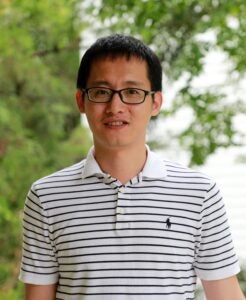 Wenjie Liu, PhD
Wenjie Liu, PhD
Postdoctoral Research Scientist
Microbiology, Immunology & Cancer (MIC) Department
University of Virginia
Email: xep3yf@virginia.edu
Wenjie is a research scientist in the Department of MIC, working under the supervision of Dr. Hui Zong. His current research focuses on glioma initiation, progression, and interactions with cells of the central nervous system (CNS). Utilizing a novel genetically engineered mouse model of glioma, he aims to elucidate the intricate CNS signaling pathways that drive gliomagenesis and tumor progression.
In addition to his primary research, Wenjie has extensive interests and experience in animal molecular genetics, cancer immunology and immunotherapy, and inflammatory disease.
Sara Mohamed, Ph.D
Post-doctoral Research Associate
Mariano Garcia-Blanco Lab.
Microbiology, Immunology and Cancer Biology, University of Virginia
email: jxn3ez@virginia.edu
email: sara_mohamed_1986@yahoo.com
Sara Mohamed joined the Garcia-Blanco Lab at the University of Virginia in March 2024. She is conducting her postdoctoral research under the supervision of Dr. Mariano Garcia-Blanco, focusing on RNA alternative splicing strategies to achieve tissue-specific therapeutic gene delivery while preventing ectopic expression in non-target tissues.
She earned her Ph.D. in Biochemistry from Goethe University Frankfurt, Germany, supported by a scholarship from the German Academic Exchange Service (DAAD). Her doctoral research investigated the interplay between host cellular autophagy and Hepatitis C Virus (HCV) non-structural proteins, with the aim of developing strategies to harness autophagy as an intracellular degrading mechanism against viral proteins.
Sara received her M.Sc. in Biochemistry from Cairo University, Egypt, where her thesis on hepatocellular carcinoma was recognized as the Best Master’s Thesis (2015) by the National Research Center, Egypt.
Her scientific interests center on gene therapy, RNA biology, and therapeutic delivery innovation. Outside of the lab, Sara enjoys listening to audiobooks while walking in nature.

Chandra Shekhar Misra, Ph.D., is an engineer (by Degree) turned biologist, as his interest wavered from once being a part-time environmental biotechnologist to what he now prefers to call himself: a fundamental biologist. After a brief stint in corporate world after his Bachelor´s, he returned to academia and has been there ever since.
His initial experiences piqued his curiosity to work with these seemingly inanimate life forms which not only feed us but also possess one of the most interesting physiologies for coping with different environmental factors. Yes, we’re talking about plants. He finished his PhD in Plant sciences from Portugal before moving to US for his postdoc. He did his first postdoc at UMASS Chan Medical school, working on understanding the molecular mechanism behind transcriptional buffering in budding yeast.
He joined Cliffe lab at UVA in April 2025 to work on something more translational- an area he has been eager to explore for some time now. Currently, he is focussed on understanding how host cells regulate the HSV-1 viral gene silencing by manipulating its chromatin structure.
 Steven J. Rolland, PhD
Steven J. Rolland, PhD
Postdoctoral Research Associate
Department of Microbiology, Immunology & Cancer (MIC)
University of Virginia
Email: yhj2jn@virginia.edu ; stevenj.rolland@gmail.com
Google scholar
ORCID
LinkedIn
Steven is a cellular microbiologist passionate about uncovering the mechanisms used by intracellular bacteria to infect their hosts and cause disease. He discovered his interest in host-pathogen interactions during his MSc at the University of Paris Diderot and Pasteur Institute (Paris, France), where he studied the intracellular bacterium Listeria monocytogenes. He earned his PhD from the University of Poitiers (Poitiers, France), investigating the physiology of the free-living amoeba Acanthamoeba castellanii during encystment and its interaction with the intracellular bacterium Legionella pneumophila.
In October 2020, Steven joined the Agaisse lab at the University of Virginia to study the host factors facilitating the cell-to-cell spread of Shigella flexneri. He believes that a deeper understanding of the mechanisms involved in pathogenesis is essential for combating the alarming rise of multi-drug-resistant strains by targeting host factors to disrupt bacterial pathogenesis.
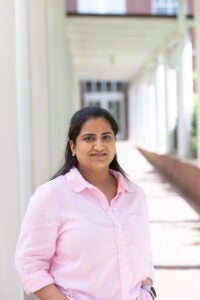

Caitlin S. Wiafe-Kwakye, PhD
Postdoctoral Research Associate
Department of Microbiology, Immunology & Cancer (MIC)
University of Virginia
Email: caitlin.wiafekwakye@virginia.edu
Caitlin is a clinical microbiologist with a strong interest in host-pathogen interactions and in developing therapeutic strategies that go beyond traditional antibiotics to prevent infectious diseases. She holds a PhD in Microbiology from the University of Maine, Orono, where her research focused on understanding the role of prophages in Group B Streptococcus (GBS) pathogenesis.
Her academic background includes a BSc in Biochemistry and an MPhil in Clinical Microbiology. She also spent five years at the Noguchi Memorial Institute for Medical Research, where she investigated the transmission dynamics of Mycobacterium ulcerans and the molecular epidemiology of diarrheal diseases.
During her PhD, Caitlin collaborated with Dr. Brady Spencer to explore the relationship between GBS prophages and the Type VII secretion system—work that resulted in a co-authored publication. This experience deepened her interest in secreted bacterial effectors and microbial interactions. In September 2024, she joined the Spencer Lab, where she is currently investigating the mechanisms of a toxin secreted by the Type VII secretion system in GBS.
Caitlin is also passionate about science communication and outreach. She has participated in various initiatives, including mentoring students through the National Summer Undergraduate Research Project.
 Xian Zhou, PhD
Xian Zhou, PhD
Research scientist
Department of Microbiology, Immunology & Cancer (MIC)
University of Virginia
Email: krt9kk@virginia.edu
Xian completed her graduate studies at Fudan University in Shanghai, where she gained valuable experience in both human and mouse vaccine development, adjuvant screening, and evaluation of immune responses post vaccination. In 2017, she joined the Mayo Clinic as a postdoctoral fellow, focusing on metabolic regulation of immune cell development and function, as well as immune metabolism in autoimmune diseases.
Driven by a strong interest in cancer immunology, she later joined Dr. Hui Zong’s laboratory at the University of Virginia (UVA) to investigate immune surveillance against pre-cancerous cells during the premalignant stage of breast cancer. The Zong lab has developed a triple-negative breast cancer (TNBC) mouse model using stochastic Brca1–Trp53 knockout with Mosaic Analysis with Double Markers (MADM) (Zong et al., Cell, 2005; Zeng et al., Dis. Model. Mech., 2023) in active mammary progenitors. Using multiple spatial profiling tools, she discovered that immune surveillance—particularly T and B cell–driven immune aggregate formation—plays a critical role in restraining premalignant progression long before tumor formation.
